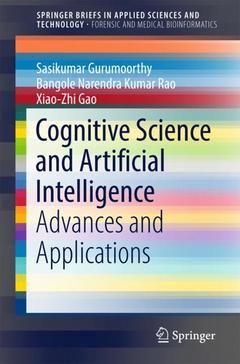Description
Cognitive Science and Artificial Intelligence, 1st ed. 2018
Advances and Applications
SpringerBriefs in Forensic and Medical Bioinformatics Series
Authors: Gurumoorthy Sasikumar, Rao Bangole Narendra Kumar, Gao Xiao-Zhi
Language: English
Subjects for Cognitive Science and Artificial Intelligence:
58.01 €
In Print (Delivery period: 15 days).
Add to cartSupport: Print on demand
Description
/li>Contents
/li>Biography
/li>Comment
/li>
This book presents interdisciplinary research on cognition, mind and behavior from an information processing perspective. It includes chapters on Artificial Intelligence, Decision Support Systems, Machine Learning, Data Mining and Support Vector Machines, chiefly with regard to the data obtained and analyzed in Medical Informatics, Bioinformatics and related disciplines. The book reflects the state-of-the-art in Artificial Intelligence and Cognitive Science, and covers theory, algorithms, numerical simulation, error and uncertainty analysis, as well novel applications of new processing techniques in Biomedical Informatics, Computer Science and its applied areas. As such, it offers a valuable resource for students and researchers from the fields of Computer Science and Engineering in Medicine and Biology.
Dr. Sasikumar Gurumoorthy a Professor in the Department of Computer Science and Systems engineering at Sree Vidyanikethan Engineering College at Tirupati, India. He has published more than 90 technical papers in various international journals, conferences, and book chapters and has guided 57 Students for their M.Tech, B.Tech, MSc, B.Sc., degrees in both computer science, Computer Science and Systems Engineering and Information Technology. He is associated with many professional bodies like CSI, IAENG, ISTE, AIRCC, IACSIT, IDES, IFERP, WASET, and INEER. He is on the editorial board of several international journals like AIRCC, NCICT, MAT Journals, IFERP, IFERP, IJERCSE and he is a reviewer for over 11 international journals. His current interests include soft computing and artificial intelligence in biomedical engineering, human and machine interaction and applications of intelligent system techniques, new user interfaces, brain-based interactions, human-centric computing, fuzzy sets and systems, image processing, cloud computing, content-based learning and social network analysis.
Dr. Bangole Narendra Kumar Rao received his Ph.D. degree from Jawaharlal Nehru Technological University, Hyderabad. He is currently a Professor at the Department of Computer Science and Systems Engineering, and has been the Chairman, Board of Computer Science and Systems Engineering. He has also been the Head of the Department of Computer Science and Systems Engineering since July 2014. He has published more than 15 scientific papers in the field of Software Testing. His research interests include Software Process Optimization, Soft Computing Techniques and Data Mining in Computer Science and Engineering.
Dr. Xiao-Zhi Gao received his B.Sc. and M.Sc. degrees from the Harbin Institute of Technology, China in 1993 and 1996, respectively. He earned a D.Sc. (Tech.) degree from the Helsinki University of Technolo
Includes supplementary material: sn.pub/extras
These books may interest you

Proceedings of the 2nd International Conference on Computational and Bio Engineering CBE 2020 232.09 €



